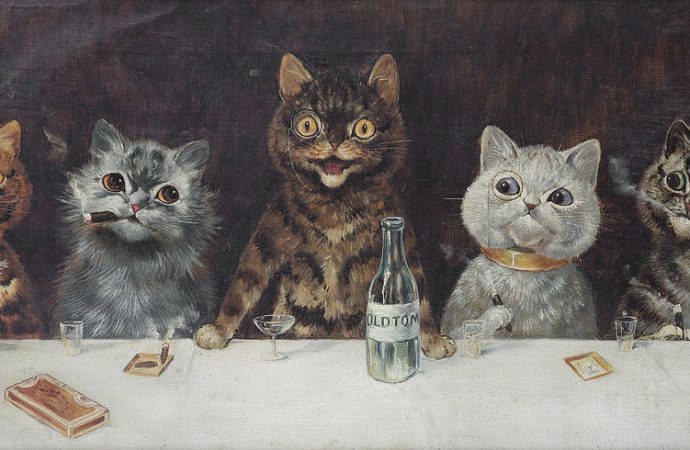I was sitting on a chair with the cat on my lap, when I stumbled upon a recent study that found no connection between schizophrenia and the parasite Toxoplasma gondii. I immediately began to laugh out loud, and I suspect even kitty cat did. It felt like an ironical revenge against many science writers. I know, this is mean, but if you happened to have read my previous article “Busting the myth: do cats cause schizophrenia?”, you would understand my point and how little I felt sorry for the writers that advertised how cats will turn you into a lunatic. However, scientists always need to slow down and reduce the initial excitement to avoid being fooled. Let’s briefly summarize the whole toxoplasma-cat-schizophrenia situation.
Why blaming the cat?
Last summer hundreds of popular science articles claimed that cats literally drive you crazy, as proven by a scientific research. As a matter of fact, the study performed statistical analysis on the output from different questionnaires given to families with a schizophrenic member. What they observed is that in 50% of the cases the family owned a cat. I know, cats can be pretty naughty, but they would not intentionally madden you. Hopefully. The underlying cause behind cat ownership and schizophrenia was believed to be the presence of T. gondii in cat feces. This parasite would conquer your mind and negatively influence your behavior. However, the latest research conducted by Sungden and her team found no evidence for a correlation between the parasite and schizophrenia or, in general, mental illness. Hence, how possibly could your kitty cat poo infect you?!
[expand]
T. gondii, the parasite responsible for toxoplasmosis, has managed to infect almost 1/3 of the world’s population and has developed mechanisms for escaping the human immune system.
Transmission of T. gondii to humans has been commonly associated with consumption of raw or uncooked meat, especially of pig or sheep. In addition, toxoplasmosis is strongly associated with human contact with cat’s feces, since T.gondii can live and reproduce in the digestive tracts of felids, a group of animals that includes cats. T. gondii reproduction in cat’s digestive system happens via tissue cysts, when the cat consumes an infected mouse.
Pregnancy is another way of toxolasmosis transmission. When a pregnant woman comes into contact with the parasite, there is a chance that the fetus also becomes infected, by direct transfer through the placenta. 
source:CDC/Alexander J. da Silva, PhD/Melanie Moser [/expand]
What seems odd, however, is that for over 60 years we believed T. gondii could cause mental disorders, and there are about 40 reports supporting this view. White flies in scientific experiments are generally labelled as errors, and in biological systems this is more common than you would expect. Contaminations, wrong sampling, false positive, false negative are like the dozen of uninvited guests that always show up at parties. What you do is simply disregard them. However, sometimes they may expose flaws from precedent studies, errors that may have propagated, and reveal that the king is naked. In this case, what is the difference between this latest study and the preexistent bunch of literature? Let’s have a look at how the experiments were designed.
A new study to the rescue
One of the major difference between the recent Sugden et al. (2016) study and the previous ones is the sampling strategy. Most of the earlier investigations looked at schizophrenic populations and determined how frequent the infection from T. gondii was. This means they checked the probability of the infection given the disease. Whereas the new research did the opposite: they took a random group of people and they checked if they were infected and if they had any mental impairments, which means determining the probability of the diseases given the infection. Nonetheless, there are various strains of T. gondii, some more aggressive than others. Karin Sugden and her co-workers found that about 30% of their participants were infected, however the percentage of identified schizophrenics was much lower than that. This could indicate that only a few strains of T. gondii can alter your mind, but the study did not determine which ones.
Another difference is the timeframe considered. Past studies combined together people from different ages that suffered from mental disorders at any time of their lives. On the other side, the new study looked at people aged 38 only, their medical history of future issues were not considered. Different approaches, different goals, different results.
What does all of it mean? Does the parasite T. gondii cause mental issues or not? I know you want a clear answer. The general belief is that science gives clear answers, but I am afraid I have to disappoint you: researchers are never sure their conclusions are the real ones, and most of the time they provide more new questions than answers. They are always waiting for other studies to confirm or confute their ideas. Future studies will tell us more, and one day we may know if there is a relationship between cats, the parasite and mental impairments. Biased as I may be, I like to believe that having a pet will never cause any harm. What I can recommend, however, is to not to eat your cat poo while we wait for new studies.
Sources:
Fuller Torrey, E., Simmons, W., & Yolken, R. (2015). Is childhood cat ownership a risk factor for schizophrenia later in life? Schizophrenia Research, 165 (1), 1-2 DOI: 10.1016/j.schres.2015.03.036
Sugden, K., Moffitt, T., Pinto, L., Poulton, R., Williams, B., & Caspi, A. (2016). Is Toxoplasma Gondii Infection Related to Brain and Behavior Impairments in Humans? Evidence from a Population-Representative Birth Cohort PLOS ONE, 11 (2) DOI: 10.1371/journal.pone.0148435
Image Credit: Louis Wain [Public domain], via Wikimedia Commons





